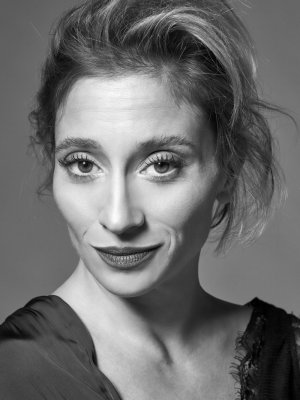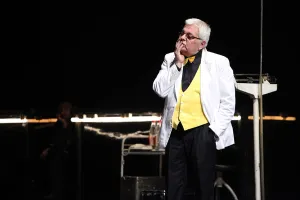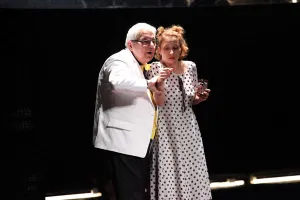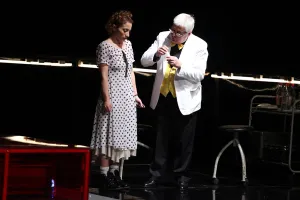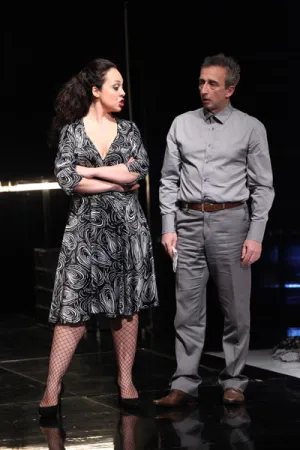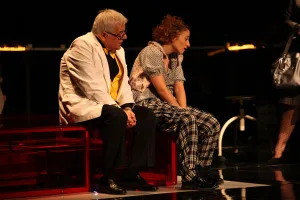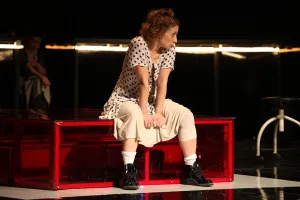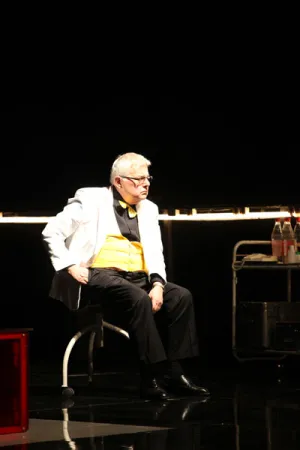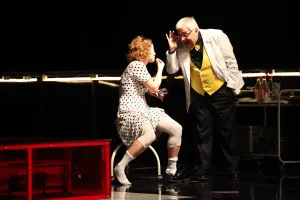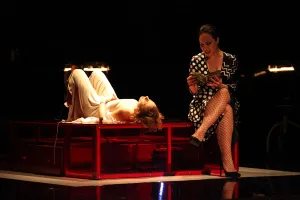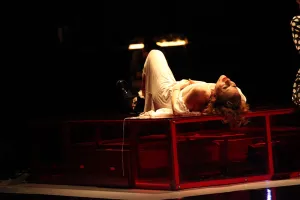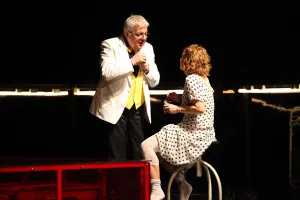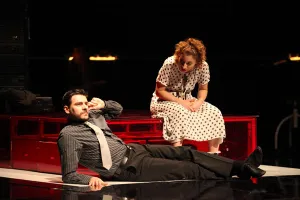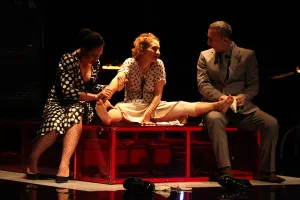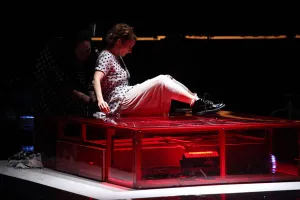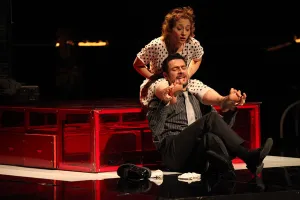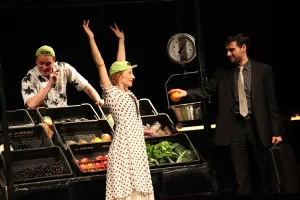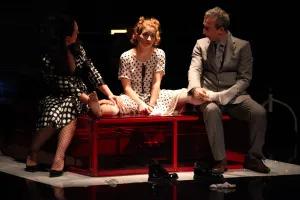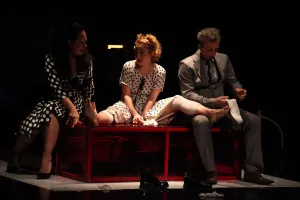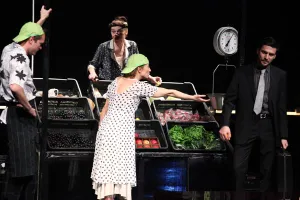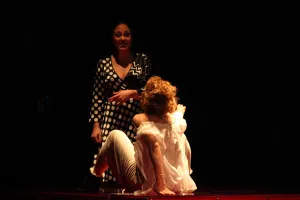The sexual neuroses of our parents
drama by Lukas Barfuss
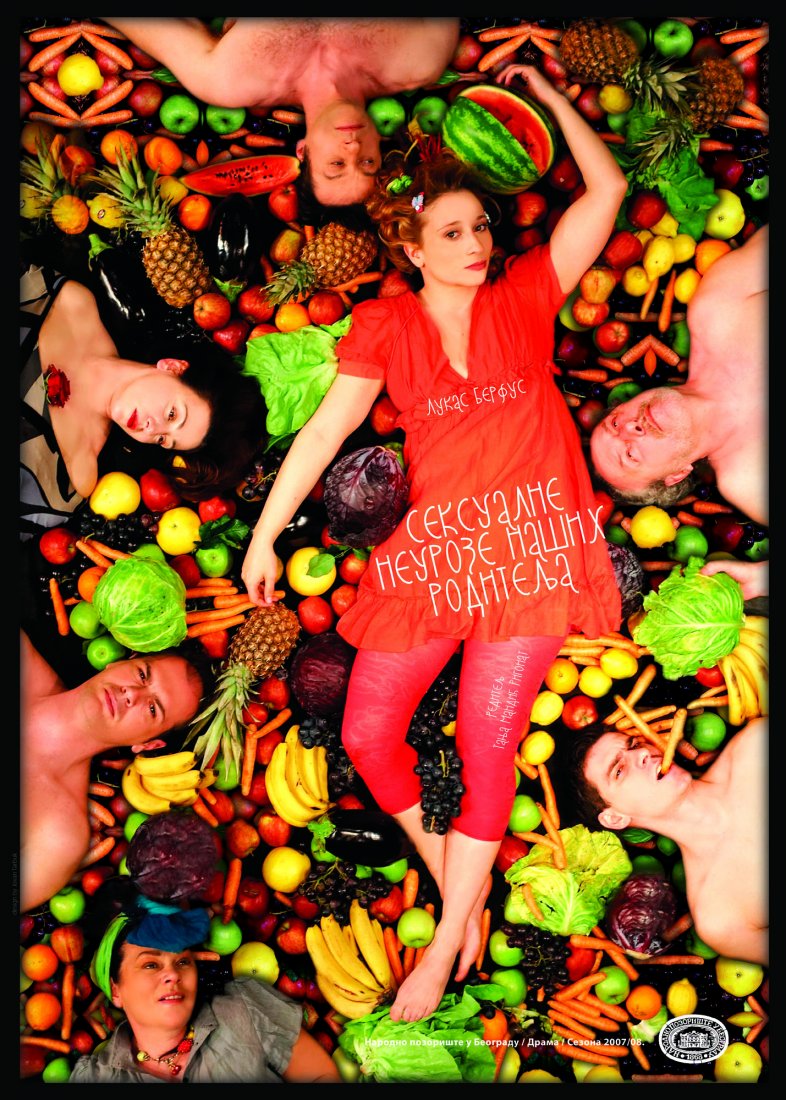
NEUROSIS is relatively mild
functional mental disorder arising from no apparent organic lesion. All neurotic disorders are psychogenic; therefore neuroses are also called psychoneuroses and neurotic disturbances. The neuroses include anxiety attacks, certain forms of depression, hypochondriasis, hysterical reactions, obsessive-compulsive disorders, phobias, various sexual dysfunctions, and some tics. They have traditionally been thought to be based on emotional conflict in which a blocked impulse seeks expression in a disguised response or symptom. Behavioral psychologists regard them as learned, inappropriate responses to stress, which can be unlearned.
(Wikipedia)
NEUROSES are mental
disorders rooted in psychic conflict in early childhood. Later, that conflict remains unconscious. According to Freud, neurosis is intrapsychic conflict between instinctual impulses (id) emerging from the deepest strata of the human mind, ego structure, and super ego structure. Ego structure defends itself by suppression and sublimation, and if it fails in that neurotic symptoms occur. We know several types of neuroses: phobia (neurosis of fear), hysteria (conversive neurosis), forced neurosis, psychosomatic illness. Therapy is based on psychotherapeutic approach to illness. According to Freud, many types of neuroses (phobias, hysterical paralysis and pain, some types of paranoia, etc.) are rooted in deep traumatic experiences in patient’s past life, but they are forgotten and hidden from his consciousness.
(Medical Encyclopedia)
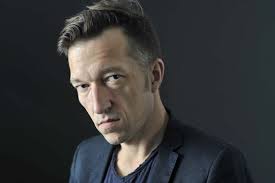 LUKAS BARFUSS
LUKAS BARFUSS
Mother:
Somehow I always thought about those wildlife films that show how an animal with even the slightest injury doesn’t stand a chance. The lion steps on a thorn, he can’t hunt any more, that’s that. Deformed offspring get eaten by the mother there and then. Just one foot with six toes will do it. Because a living thing with six toes is not fit for life. We humans are different. (The Sexual Neuroses of our Parents) Lukas Barfuss was born in 1971 in Switzerland where he also grew up. He graduated in library sciences. Since 1997, he has been a freelance dramatist and a prose writer. In 1998, together with Samuel Schwarz, he founded the theatre group “400 asa” for which from then on he regularly wrote plays. In 2002 he was awarded City of Zurich Cultural Award, and soon after City of Berne Literary Award. Hamburg’s Deutsches Schauspielhaus commissioned him to write a play Othello – ein Blue Movie. It was not the first time he did a reinterpretation of the classics. In 2000 he wrote a play Medea 214 picture descriptions, for the Vienna Theatre Festival. Later, he dramatized Henry IV. He also wrote a book The Dad Men. The Sexual Neuroses of Our Parents was commissioned by the Theatre Basel in 2003, and soon after the premiere it was produced in Hamburg, Stuttgart, London, Berlin and other European cities. In 2003 he received “Theater heute”, an influential prize for best contemporary author. In 2005 he was awarded for his play The Bus, same year he was proclaimed as the best playwright of the year. His plays have been produced in Germany, Switzerland, England and other European countries. In Scandinavia, he is one of the most widely performed writers. His last play The Proof was written in 2007 and first produced by Munich’s “Kammerspiel Theater”. In his plays, Barfuss treats extremely serious problems facing modern society and perfectly recognizes and indicates causes of social conflicts. One of the topics he often observes is the issue of death, which is relativized in the capitalist, consumer era. He also treats questions concerning abortion, euthanasia, suicide and other mechanisms of social repression. In all his plays he highlights human weaknesses; in his own words: “To me people are at their most human when they are living with all their contradictions and attempting to handle them. All of us are heroes in the same way. However, being weak, failing, there’s something very personal and charming about that.” Barfuss analyzes human behavior from the viewpoint of the scientist, putting it under the microscope, examining it objectively, without judging. In his play The Bus or The Makings of a Saint, he treats an issue of religion in the post-atheistic society. In The Sexual Neuroses of Our Parents, he observes a problem of social control rooted in the family. It is interesting to mention that in almost all productions of this play Dora’s autism, i.e. the nature of her mental illness has been kept in the foreground. In a play Alice’s Journey to Switzerland, Barfuss treats a problem of euthanasia, and in his last piece The Proof, he is occupied with family relationships in the 21-century, a century of DNA in which social reality is modified by biological reality. In his pieces, the topics are given the treatment of the grotesque in the “open” form; in that way author challenges directors and actors to present to an audience various different interpretations. Barfuss observes and describes actual phenomena within contemporary society through witty dialogues and very touching monologues clearly showing today’s consumer-controlled world, which treats any diversity as a possible danger.
Maja Pelević
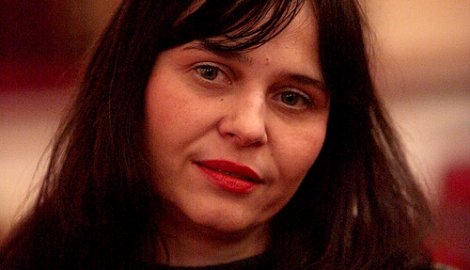 TANJA MANDIĆ RIGONAT, director
TANJA MANDIĆ RIGONAT, director
She graduated in directing from the Faculty of Dramatic Arts in Belgrade, in the class of professor Dejan Mijač. She has directed the following performances: Lovely Rita, Miss Julia by A. Strindberg (Atelje 212), The Hilarious Tragedy by D. Kovačević (Vršac), Lolita by V. Nabokov (BITEF Theater), George Washington’s Loves by M. Gavran (Atelje 212), Bergman’s Sonata (National Theatre of Belgrade), Thornapple by J.Stein (BELEF), A Man of Coincidence by J.Reza (National Theatre of Belgrade), Collected Stories by D. Margulis (Atelje 212), Ear, throat, knife by V. Ruden (Atelje 212), Dead Ears by O. Bogayev (National Theatre of Sombor), The Terrace by J. Hristić (Yugoslav Drama Theater), Frozen Glowworm by V. Radoman (Madlenianum), Oxygen by I. Vyrypaev (Yugoslav Drama Theater), The Judge by V. Moberg (National Theatre of Belgrade), Love Letter by F. Arrabal (BITEF FESTIVAL – CERVANTES), Hitler and Hitler by C. Kostenko (Atelje 212). She has also dramatized novel Lolita (together with B. Maksić), C. Bukowski’s The Devil Was Hot, novels Dead Souls by N.Gogol (directed by D. Mijač) and Demons by F. Dostoyevsky. Performance Oxygen was awarded by TV Metropolis, for the best performance of Year 2005. She has written collections of poems Mystery of Happy Contrabass and From the Lives of Birds.
THREE DRAMATURGE’S QUESTIONS FOR TANJA MANDIĆ RIGONAT
BORN TO LIVE THE LIFE TO THE FULL
Before The Sexual Neuroses of Our Parents you have directed contemporary Russian plays (Oxygen, Hitler and Hitler). What was your key reason to put on the stage this play by Swiss-German author and what cultural and social differences you have noticed between the two societies (Russian and Western European) while reading their authors and analyzing the topics they are occupied with?
Constantin Kostenko whose play Hitler and Hitler I have directed for the Atelje 212 and Ivan Vyrypaev whose play Oxygen I have also directed are the two outstanding authors, dramatists that are not to be compared with each other, thus very special gems not only in contemporary Russian drama. However, if I should indicate a common element between them, then certainly it would be successful combination of moral dilemmas set by the great 19th century novelists and experimentalism introduced by Russian avant-garde dramatists from the early years of the 20th century, I think primary of Vedensky and Kharms. Their dramas are formally experimental, firmly tied to the principle of theatre arts, and various possibilities and peculiarities of scenic expression. Their dramas are not mimetic, but expressive ones. Furthermore, both of the authors treat problems and phenomena of our contemporary world in a cruel, witty, shocking way. The metaphysical dimension is emphasized, as well as humor – so precious instrument for writers and for spectators that helps us to face with the evil within an individual and within a society. Wittiness is their common characteristic. They are both against consumer principle in life and in theatre. In their dramas reality is sublimated and transformed into a piece of art, which is per itself upgrading of life. Phenomena are not recorded, but analyzed at various levels, through the principle of improvisation and transformation. And really, new forms shed a new light on problems and facts we thought we knew everything about. Those are dramas with no didaskalias, open for free interpretation, even for recomposing of the storyline. In my opinion, contemporary Russian literature is the most fascinating among European literatures. One who has read contemporary Russian novelists and dramatists knows what I mean; this is not an expression of obsessive russophilism, but recognizing of something new, different, and valuable. It seems to me that here, in our circles, majority is locked in Russian literature of the 19th and the first half of the 20th century. However, it is not possible to view and to understand oddities of the 21st century through the eye of the 19th century. Contemporary Russian art, I mean its greatest representatives, has nothing to do with our local prejudice, with our narrow-minded reasoning. But, generally we have problems with everything that is new and different. Today’s Russian films and literature are in serious dialogue with history, literature background, and contemporary world. After all, what does social engagement mean? To my mind, every piece of art that breaks down taboos, that reconsiders stereotypes, casts new light on reality, is engaged one, for it presents a new value, a new significance in regard to everything already known. Russian reality is charged with huge contrasts, absolute extremes. The drama I am working on now is formally “more conservative”, with a clear storyline, characters, situations. It is written in a clef of fragmental dramaturgy, which is not a novelty. Still, Barfuss’ play is marked by something very precious and very unique. The author has found the original way to tell us the story about innocent, guiltless human being and its destiny - that on a broader plan becomes a metaphor for the possibility of human freedom in society. The story is very touching and multidimensional. It is about a teenage Dora, who has been anesthetized with the drugs, on her parents’ and doctors’ decision. She has not attended school, nor has any experiences about outside world; she has no social intelligence nor manipulative tactics and capabilities. To think, to feel, to speak, to act – it is all the same for her. Her mother, with doctor’s approval, decides to take her off the drugs in order to see what is hidden “behind her frozen expression, behind that pharmaceutical curtain”. What she finds is Eros, life’s energy, revealing of sexuality… Dora’s situation becomes a polygon for examining the social values, because restrictiveness, aggression, brutality of society is always most easily detected on female issues: on relation towards female sexuality, abortion, and personal freedom… The Sexual Neuroses of Our Parents, as well as Russian dramas I have directed, is an expression of disappointment, a kind of protest against cruelty of the world, society in which to grow up means to give up own life, own wishes, own true needs and to learn to lie, to be prudish and mean, to annihilate Eros as the most divine life principle… Barfuss knowingly shows functioning of a world without love, mechanism of social perversities, emerging of neurosis under the pressure of society. Truly, the cruel he is, the witty he is. I was caught up by his story, and I wanted to interpret it as a critic of nowadays morality. Sexual game is a sacred sphere where child inside us is initiated into the world of adults, into the world of death. According to Barfuss, growing up is nothing else but torturing and killing the soul. To be grown up means to be adapted. What to? In a word, I was caught up by the subject, by the story, by the possibility of composing interesting scenic forms, by having a chance to present my own opinion about normality, social health, mechanisms of manipulation represented by those who create the norms of acceptable and unacceptable behavior in the varied fields of life. In formal aspect, the challenge was to find the clef for fragmental dramaturgy that implies not linear alignment of scenes, but the vertical one. I founded my interpretation in morality form and presented Dora’s case by imitating the group therapy session (all actors on the stage are placed in niches, as in a temple). When I solved the problem of space, I found the clef for the insightful reading of psyche, social games and roles, which is opposite from simple, horizontal following of a storyline.
How do you understand The Sexual Neuroses of Our Parents (as a term and as a drama) and what is its purpose in our today’s society?
It is not incidentally that the main protagonist is named after Freud’s famous patient: protecting the identity of 18-year-old girl who suffered from hysteria, Freud gave her name Dora. Later, he published a study on this case under the title Dora, Fragment of an analysis of a case of hysteria. Barfuss’ drama does not present a stage analysis of Freud’s Dora. It is absolutely autonomous piece of art, with the very clear references to psychoanalysis, especially to Freud who introduced analysis of unconscious psychic phenomena primary through dream analysis and who emphasized the fact that neurosis is organic condition, caused by sexual factors. Neurosis appears as a result of conflict between instinctual impulses and social requirements in which the super-ego is grounded. The title of drama The Sexual Neuroses of Our Parents, if viewed from the perspective of psychoanalysis is a pure pleonasm. Author strongly emphasizes the role of sexuality in the neurosis of an individual i.e. society. In her study The Neurotic Personality of Our Time, Karen Hornay argues that every neurosis is rooted in a lack of love in the childhood. And since neurosis is deviation from normality, it should be noted that concept of normality modifies in regard to society, class, community… Dora is the only character in the drama that has a name, the other characters are named according to their relationship with Dora: Dora’s parents, Dora’s boss, Fine Gentleman…
Why do you think that most of the European productions of this piece place in a foreground problems and issues in the treatment of mentally retarded children and what are the most important questions you have arisen while working on this performance?
I don’t know. To my mind, to be marked, to be “socially ill”, has much broader connotation. Love, gift, sensibility, tenderness, sincerity, honest, spontaneity, directness, purity, these are all “symptoms of illness” in the repressive world based on pseudo values and pseudo freedoms. Some friends of mine, psychologists, have read the drama and confirmed what we were talking about at rehearsals, that Dora’s case is not an illustration of one specific illness or mental disorder. She is an artistic, but not a medical fact. She is some kind of id, universal child within classification of persons. She is the mirror that catches the images of those around her and reflects their perverted values - parent’s love-nonlove, social authorities personalized in bosses and doctors, those in charge of supervising our appropriateness, correctness, effectiveness in “the world of social health”. In my life, apart from belles-lettres, I have been deeply fascinated by psychological literature including Sasse, Reich, Jung, Fromm, Freud, K. Hornay and finally Summerhill – A Radical Approach to Child Rearing…I do feel the social castration in the time we are living in and I think that Dora’s case is of universal value. That is a story about child who has run into the world and started to learn its alphabet, as a score: unfortunately, this venture does not stimulate her life energy, but annihilate the highest ideal of being a whole, unique, unrepeatable person born to live the life to the full.
Interview conducted by Maja Pelević
THERE ARE NO IMPULSES WITHOUT FREEDOM, AND NO FREEDOM WITHOUT IMPULSES
(V. Frankl)
It is very well known from psychological literature that neurotic persons are not capable to harmonize their personal aspiration with the requests of outside world, although their sense of reality is not affected as in the case of psychotic persons. For that reason, neurotic person lives under the pressure of emotional stress, fear, depression and other psychopathological disturbances. This symptom of disturbance within psyche structure has been known since classical times; in our time it is generally accepted that neurosis is a normal human experience, part of the human condition. There is also so-called neurotic character that is marked by the feeling of inferiority that is demonstrated through aggression, hysteria and a need for self-punishment. Such person has a rigid ego and suffers from certain degree of personal disintegration in regard to its own sexuality, which results in a false moral. A neurotic human is also an alienated human (Alienated person is not in contact with itself nor with the other persons. It perceives itself as the things are perceived, through the senses and reason, but does not realize productive communication with itself nor with the outside world, Erich Fromm). Psychoanalyst Karen Hornay, involved in research on alienation phenomena, argues that this process degrades human personality, disabling its development and chances to get to know itself. Disintegrated, such a human is in conflict between what it is and what, under the pressure of neurosis, it should be. When faced with reality, it perceives itself as a worthless being. Freud argues that neuroses originate in childhood. (Reasons can be various, but one is lack of true authority during the growing up period, lack of firm postulates concerning ethical behavior of right and wrong, good and bad, allowed and forbidden). Alfred Adler also thinks that neurosis is a negative phenomenon. However, for Carl Gustav Jung, neurosis is not absolutely negative for it brings person a message full of meaning. A person can, if adequately faced with neurosis, initiate a process of regaining consciousness to its unconscious mind, thus integrating contradictory strata of its own being. According to Jung, neurosis can stimulate the process of becoming a whole person, which is the aim of individuation. But, this is not possible without person’s intimate deliberation from identifying itself with Persona – social mask that protects person from social injuries, yet it can be very dangerous if person identifies itself with it. Similar to Jung’s is Karl Jaspers’ approach. He argues that the aim of psychotherapy is not good enough if a person develops only so called health being. It results in forming of conformist persons that are not anymore interested in the meaning of their own existences. A man has an essential need for freedom and it is generally accepted that “every time when personal freedom is suspended it results in compensation, because people strive for freedom with their lowest impulses. That’s how it comes to abnormal forms of behavior: evil, malice, orgies, and greed. Only developed person can reach eroticism, which is different from procreation; eroticism belongs to the sphere of sexuality, but it extends beyond the realm of sexuality. According to Stekel (not only to him), a true love is the cure that heals everything. Referring to love, a dialogue between Socrates and Diotima can be very inspiring. To Socrates’question: Who is more perfect, the Lover or the Lovable, Diotima answers: The Lover, for God lives inside it.
Sanja Živanović
Premiere performance
Premiere, April 30, 2008 / "Raša Palovic" Stage
Translation Bojana Denić
Director Tanja Mandić Rigonat
Set Designer Aleksandar Denić
Costume Designer Milena J. N. K.
Stage Speech Ljiljana Mrkić Popović
Dramaturge Maja Pelević
Stage Movement Damjan Kecojević
Music Selection Tanja Mandić Rigonat
Sound Designer Zoran Jerković
Premiere cast:
Dora Vanja Ejdus Kostić
The fine gentleman Igor Ðorđević
Dora’s mother Dušanka Stojanović Glid
Dora’s father Slobodan Beštić
Dora’s boss Miloš Ðorđević
Dora’s doctor Miodrag Krivokapić
A woman, the boss’ mother Dobrila Stojnić
Organizer Saša Petković
Stage Manager Miloš Obrenović
Prompter Danica Stevanović
Lighting Designer Srđan Mićević
Make-up Designer Dragoljub Jeremić
Stage Master Zoran Mirić
Sound Designer Nebojša Kostić
Costumes and sets were manufactured in the workshops of the National Theatre of Belgrade







